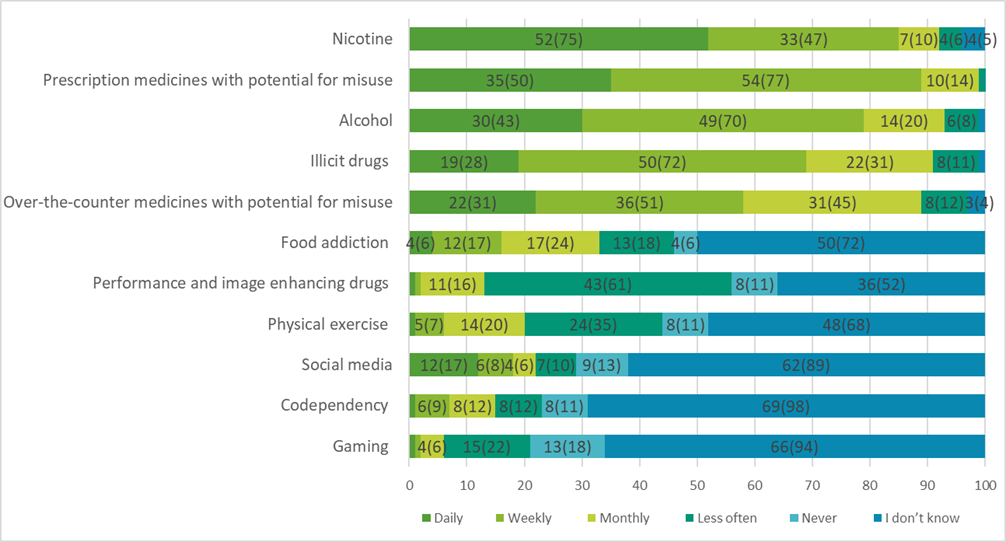Are we prepared to tackle addiction in community pharmacies?
Alcohol, Drugs, GamblingSara Tsokkinen, Mikko Lemettilä, Emmi Kauppila, Jukka Koskelo and Marika Pohjanoksa-Mäntylä Published 1 Oct 2025
In this PopNAD article, Sara Tsokkinen, Mikko Lemettilä, Emmi Kauppila, Jukka Koskelo and Marika Pohjanoksa-Mäntylä present findings from a new Finnish study exploring the role of community pharmacies in addiction prevention and care. Pharmacists frequently meet customers struggling with nicotine dependence, alcohol problems, or medication misuse - yet these issues are rarely addressed in everyday interactions. The study shows that while pharmacists are ready and willing to engage in addiction-related counseling, they lack the tools, training, and structural support to make it part of routine practice.
A recent survey among Finnish community pharmacists highlights the everyday presence of addiction-related concerns in pharmacy practice. Conducted among 143 respondents via online survey across five collaborative areas of Finland, the study found that pharmacists regularly encounter customers suspected of nicotine dependence, prescription medication misuse, alcohol use disorders, and other substance-related problems. Yet these concerns were seldom addressed during customer interactions. While pharmacists expressed a clear willingness to support individuals facing addiction, many felt they lacked the tools, confidence, and structural support needed to do so. Reported barriers included uncertainty about their own abilities and fear of triggering negative emotional reactions.
New initiatives linking pharmacies to addiction care needed
In Finland, alcohol-related deaths and drug-related mortality among young people remain a pressing public health issue. Community pharmacies, where people regularly seek advice and medication, are uniquely positioned to spot early signs of addiction, and provide brief interventions. Pharmacists are widely trusted professionals and maintain frequent contact with individuals who may be experiencing substance-related or behavioral challenges. While earlier research shows that pharmacy-based interventions can be effective, addiction-related work in these settings has so far received only limited attention.
From evidence to action: how the results can impact society
The study reveals a clear gap between recognition and response: pharmacists often notice addiction-related issues but rarely act on them. Bridging this gap could enable earlier support and lead to improved outcomes. One way forward could be to introduce structured screening tools (like validated questionnaires) and brief intervention protocols, making addiction-related conversations easier to manage. Expanding addiction-related education in both pharmacy curricula and continuing professional training would also strengthen pharmacists` confidence and competence, helping them step in when needed. A stronger integration of addiction-related tasks into routine pharmacy practice could normalize such conversations and reduce stigma. At the same time, closer collaboration between pharmacies and addiction services would ensure clear referral pathways and give pharmacists the support they need to guide customers toward appropriate care.
The study also underlines that behavioral addictions remain poorly recognized in pharmacy practice; raising awareness and developing tools would broaden the scope of support. (see figure 1) Ultimately, recognizing addiction support as part of pharmacy services could unlock new avenues for public health impact, if backed by sufficient funding and infrastructure.

In short;
The study makes clear that pharmacists are ready to support people struggling with addiction – but without the right tools, training, and collaboration, this potential remains untapped.
The article is written by
Sara Tsokkinen. M.Sc. student (Pharm.), University of Helsinki
Mikko Lemettilä, M.Sc. (Pharm.Sci.), A-Clinic Foundation
Emmi Kauppila, PhD researcher, Tampere University
Jukka Koskelo, M.Sc. (Health Care), R&D Director, A-Clinic Foundation
Marika Pohjanoksa-Mäntylä, PhD (Pharm.), university lecturer, University of Helsinki
on the request of PopNAD.


